#Lannes
Text
whiteboard doodles dump!
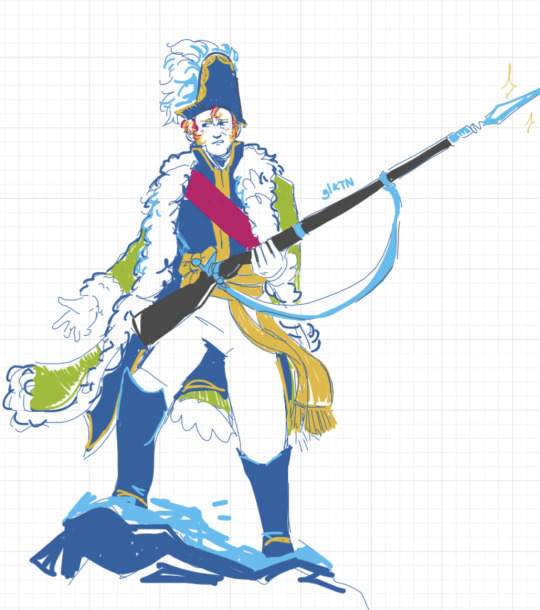
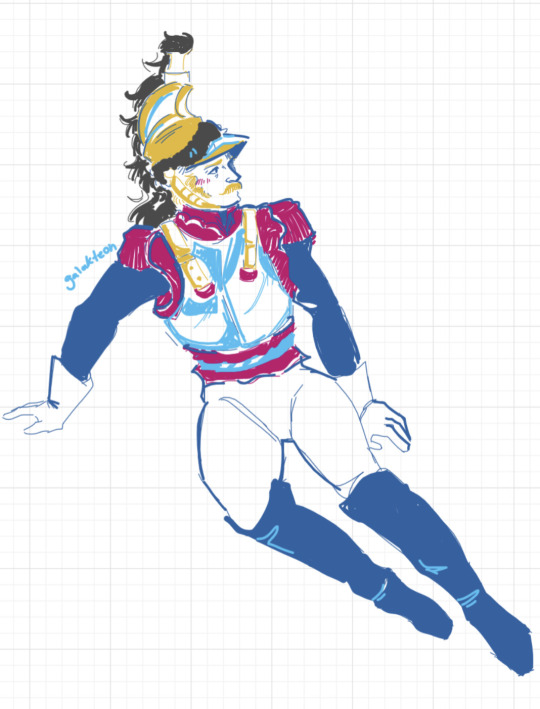
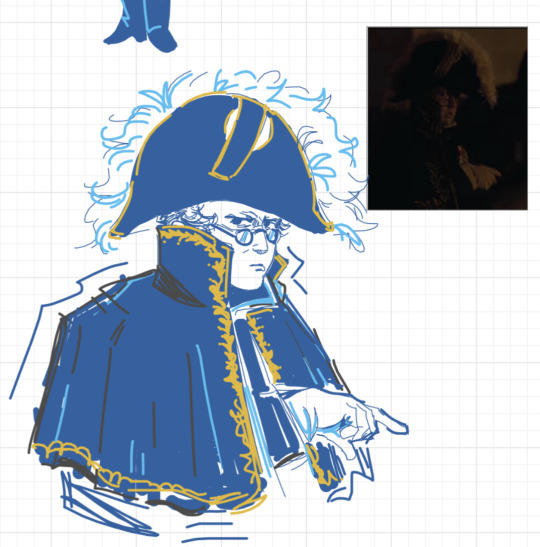
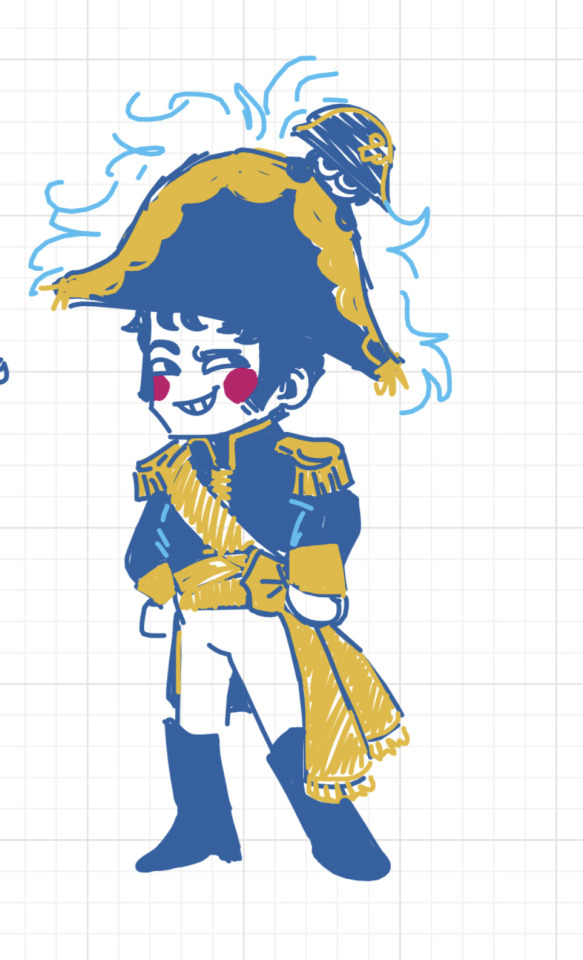
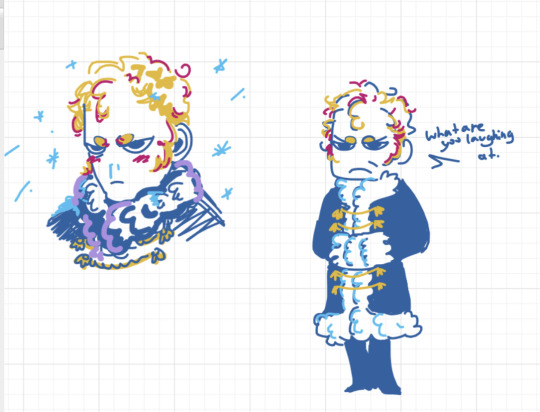
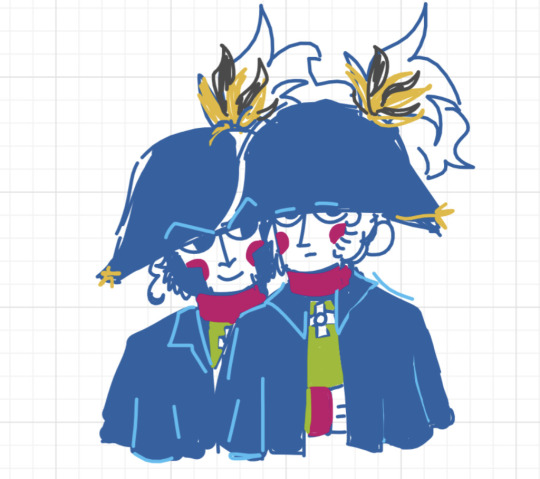
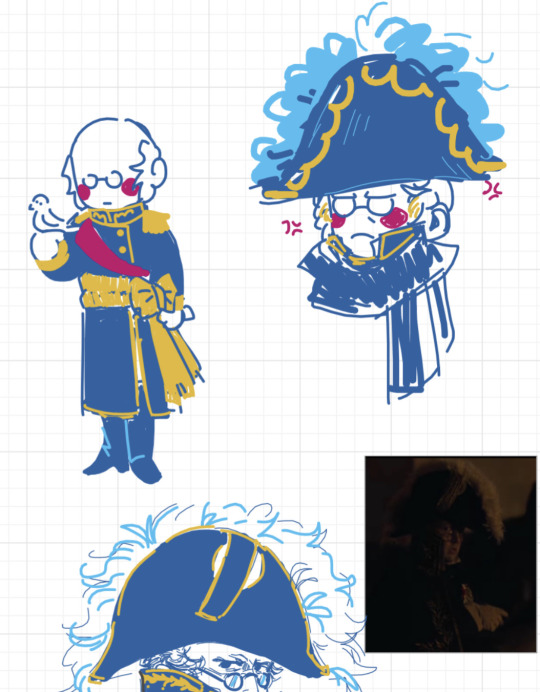



(apologies for some of the pictures being horribly cropped oops)
#i just love this website sm especially drawing with friends#napoleonic wars#art#history art#napoleonic#michel ney#napoleon#lannes#davout#barclay de tolly#bagration#tsar alexander i#my art
157 notes
·
View notes
Text

HAPPY BIR.THDAY LANNES.!!1!11!1!!!
#jean lannes#lannes#napoleons marshals#napoleonic wars#i have not sat down and drawn ANYTHING in weeks. praying it doesnt show😓😓#i heart lannes#pulled myself outta art block for this 1#rave art
81 notes
·
View notes
Text

I completly forgot to share the coloured Version of this one
#napoleonic shitpost#shit post#napoleonic era#napoleonic wars#marshalate#napoleon's marshals#napoleon#joachim murat#jean lannes#louis nicolas davout#murat#davout#lannes
61 notes
·
View notes
Text

Some outdated memes but with Napoleonic personalities
#louis nicolas davout#davout#jean baptiste bernadotte#bernadotte#michel ney#ney#jean lannes#lannes#jean de dieu soult#soult#alexander i#tsar alexander i#joachim murat#murat#napoleonic#napoleonic era#napoleon's marshals#memes#my art
171 notes
·
View notes
Text
“It is generally said that there are certain wounds, to which death seems preferable; but this is very seldom the case, I assure you. It is at the moment we are going to part with existence that we cling to it with all our might. Lannes, the most courageous of men, deprived of both his legs, would not hear of death.”
— Napoleon on the death of Marshal Lannes
(Source)
#Memoirs of the life exile and conversations of the Emperor Napoleon#by the count de las cases#vol ii#marshal Lannes#Lannes#Jean Lannes#napoleon#napoleonic era#napoleonic#napoleon bonaparte#first french empire#19th century#french empire#quotes#quotes by Napoleon#Napoleon quotes#Napoleon’s marshals
47 notes
·
View notes
Note
if i had to help my napoleon choose between a lannes, duroc or a junot to play with who would be the best choice? i'm thinking the lannes but the other two are protesting :((
Rating: Not Cute!
Buddy, did they already packbond?! You gotta take 'em all, you can't separate a pack like that without making your Napoleon cry in his soup or someone commit autodefenestration!
Adopt the entire crew. 'Oh, my house/enclosure isn't big enough for all of them.' Your Napoleon is a conqueror and you just got him a squad! Say 'good-bye, neighbors,' and 'hello new empire!'
28 notes
·
View notes
Note
I know it is only anybodys guessing really, and I truly do not want to sound like 'the historian' but you would go as far as calling these relationships of napoleon 'homoerotic'? Why? Couldn't it be the case of him having just very warm attitude and be close to his friends like that?
Again nothing against it, but I needed to ask since I as well am the person to get alike towards my close friends and I don't feel it having any attraction undertones.
Thank you for the ask! As usual for me, my response got really long.
I mean correct! It’s literally anyone’s guess. Who knows? Certainly not me! Certainly no one who is alive right now!
I’m just a queer on the internet having fun who sees Napoleon and goes "ah yes, a chaotic bisexual even though the concept of modern sexual identity wasn't a thing in his time etc. etc. [insert all the other usual disclaimers required on this webbedsite]" so that's why.
[How do I know he’s a chaotic bi? Well, it’s very simple, he couldn’t sit properly in a chair, liked to sit on his secretaries’ laps, pull their ears, and tell them Fun Facts he learned that day, and wanted to make the tsar of Russia his mistress. He also dearly loved Josephine and wrote about how he liked going down on her. This is clear proof that he was a chaotic bi king and we should be so lucky to know this about him. ;)]
I'm also a writer who likes to slap a queer lens onto most things because that's how I role and I'm very unapologetic about it. Which most people who follow me know.
I’m also someone who has incredibly deep, intimate friendships with a close selection of people in my life that are not romantic/sexual or whatever in their nature—but they are incredibly intimate. They are friendships where partners of my friends have been jealous and insecure because of how close we are—which is a them problem, not an us problem.
I would go so far as to argue that friends are more likely to slot into that problematic category of “soulmate” than anyone romantic (ymmv). And from the outside, I’m sure people might read my friendships with a few people (have read them, in fact) as romantic/homoerotic and frankly I don’t care. Whatever. I know what my friendships are, why does it matter what other people read them as? More to the point, why does it matter that someone reads a dead person’s friendships as homo-something? How does that impact my friendships which may, or may not, mirror that dead person’s friendships? Who cares? One should love one’s friends however one wishes to. Fuck everything else.
--
In an effort to avoid the Great Queer Napoleon Discourse War of 2013-14 I shall include a disclaimer because hot damn do people get REALLY uppity about this: I’m a writer, first and foremost in all things. I’m not a historian. As noted above, I’m a queer fag on the internet having fun. Take what I say with a grain of salt.
(Honestly, doing anything with Napoleon’s sexuality aside from He Was the Straightest Straight Who Ever Straighted, gets everyone’s hackles raised. I think that says more about those with hackles up than it does the person going: maybe he might have had a bit of a queerness about him, it’s not implausible.)
--
Some general stuff on Napoleon & That Doesn’t Seem Entirely Straight, Even For the 18th and 19th Century:
From Cronin’s biography on Napoleon:
“Napoleon found that his friendships with men often began with physical attraction, and this took a curious form. ‘He told me,’ says Caulcaincourt, ‘…that for him the heart was not the organ of sentiment; that he felt emotions only where most men experience feelings of a different kind; nothing in the heart, everything in the loins and in another place, which I leave nameless.’
The feeling Napoleon described as ‘a sort of painful tingling, a nervous irritability…the squeaking of a saw sometimes gives me the same sensation’.”
In addition, Talleyrand speculated Napoleon and Bourienne were, uh, intimate in all senses of the word. Talleyrand, of course, well—one should treat his hot takes with some caution.
There is also the (in)famous letter Napoleon wrote to Josephine about Alexander where he said that he and Alexander were inordinately pleased with one another and if the tsar were a woman, he’d take Alexander as his mistress (Napoleon, honey, don’t write that to your wife).
I mean, do what you want with that. Take it for what it’s worth /shrug
---
Of the three friendships under discussion: Lannes, Duroc, Junot—I always read Lannes and Napoleon’s friendship as just friendship. Duroc and Junot though. That’s where we start getting into arguments for a homoerotic friendship—or romantic friendship, if one prefers that term.
I’ll do a little ramble for each, because they all deserve it.
Lannes
Napoleon’s friendship with Lannes was intimate, close, and they loved each other dearly—but as said, I always read them as friends. Even if they lived today and were free/able to be whatever they wanted to be to one another, it’d still just be friendship.
People did make Achilles/Patroclus references to them—particularly around Lannes’ death—but that was the mode of how people spoke back then. It’s the 19th century version of comparing everything to LOTR or Harry Potter (read another classical epic people, jeez).
Their friendship was volatile for sure—these are two hot headed, strong minded, opinionated men who were not afraid to snap and snarl at one another—but at the end of the day I do not doubt their love for each other. But it’s what we would term a platonic love.
Brian Martin writes this in Napoleonic Friendship: Military Fraternity, Intimacy, and Sexuality in Nineteenth-century France:
Napoleon’s grief for Marshal Lannes took on the very public character of open lamentation. Rather than grieve behind closed doors and conceal his personal vulnerabilities in order to show public strength, Napoleon’s mourning for his beloved friend became a matter of great public spectacle. Like Achilles mourning his beloved Patroclus, Napoleon wept publicly and openly expressed his affection in a way that was widely reported, discussed, and admired by the officers and soldiers in his armies.
[…]
Napoleon’s public grief at the death of Jean Lannes represented a new model for social relations between soldiers in the early nineteenth-century France. weeping over his friend’s broken body, Napoleon demonstrated how the revolution and empire had made it possible not only for an emperor to grieve openly for a fallen marshal, but for a soldier to love his comrade. This uncharacteristic expression of affection between Napoleon and Lannes was echoes in similar relationships between officers and foot soldiers in Napoleon’s armies. Military memories of the first empire bear witness to a wide range of intimate relationships among generals, colonels, and captains as well as sergeants, corporals, and grunts (grognards), the infantry soldiers who made up the majority of the imperial armies. Napoleon’s love for Lannes might thus be said to represent a broad spectrum of masculine affection and intimacy in the ranks of the Grande Armée, or what could be called Napoleonic friendship.
So yeah, I’ve not much more to say on them. Their friendship was loving, affectionate, intimate, and complex. Lannes could be frustrated with Napoleon (often was, the longer Napoleon remained in power—because Lannes loved Bonaparte not the emperor), but Lannes loved his friend and Napoleon loved Lannes. But my read on them has always been that it was what we would term platonic.
------
Junot
This one is messy. Because Junot and Napoleon are messy people. I also think this one is the strongest case for “something more than friendship”. I personally believe Junot loved Napoleon in a deep, phenomenal, possibly obsessive fashion that absolutely was romantic—maybe sexual/erotic—and Napoleon for a time may have returned at least some of those feelings. Then it all went south.
I’m ripping a lot of this from a previous ask I received about Junot—since it covered a lot of the more romantic aspects of his and Napoleon’s relationship.
Junot and Napoleon were close friends when they were in their 20s. Incredibly close. Laure Junot, whose memoires one should treat cautiously, intimated that there was more than just friendship between them at this point. But if that is the case, we’ll never know for certain.
Brian Martin sums it up well (and saves me from having to dig out my copy of Laure’s memoir):
Soon after his imprisonment, Napoleon was released and exonerated, but with little money and no desire to take on a new military post in Brittany, he returned to Paris where, as Laure Junot explains, he lived with his comrade Junot and depended on his friend’s emotional and financial support … The 1794 letter from Toulon initiates a half-year period in the lives of the twenty-five-year-old Bonaparte and twenty-three-year-old Junot when … these ambitious young men relied on each other during their impecunious days in Paris. Describing how Junot “loved Bonaparte as one loves at the age” (1: 188), Laure Junot implies that the young Jean-Andoche developed an adolescent crush on Napoleon, as the two young men grew in intimacy.
[…]
Laure Junot tactfully observes many years later that it was difficult to assess the nature of these friendships [with Duroc and Junot] without offending their masculinity: “These are the very profound and abstract mysteries of the human heart. It is difficult to explain them without first wounding a man’s dignity” (11: 131).
In relegating Napoleon’s military relationships to the realm of the mysteries, Laure Junot defines Napoleonic friendship — long before “the love that dare not speak its name” was articulated by Lord Alfred Douglas in 1894 and invoked at Oscar Wilde’s trial in 1895 —as an enigmatic and unspeakable love incapable of being articulated without shaming a soldier’s manhood. Amid such ambiguity, it is unclear if such “mysteries” encompass both the emotional and the erotic. What is clearer is that Napoleon and Junot shared a degree of affection during their youth in Paris that was undeniably intimate.
As Napoleon climbed up the greasy pole, the power dynamic changed and expectations of interpersonal relationships became more formal putting a strain on his and Junot’s friendship. Junot, like many who knew Napoleon from the early days, loved Bonaparte, not the emperor. As Laure put it in her memoire: “Now let me explain the sadness and pain which afflicted Junot on learning that Napoleon was no longer his General Bonaparte of Toulon. Perhaps the affair simply followed a natural decline. But Junot … did not see it this way. He wanted reciprocity, which he craved even more as his own affectionate fantasies increased … He loved the man, not the emperor.”
In 1800, Napoleon named Junot Commandant of Paris on the condition that he marry because, it seems, there were too many rumours flying around about the two of them. (As noted above, Talleyrand was already making some “huh. Interesting closeness, there” comments about Napoleon.) Dutifully, Junot married Laure.
Junot always exhibited some signs of mental illness throughout his life and at one point he received a head wound (I forget which battle) that massively exacerbated whatever existing mental health troubles he had. (And note that this was one of many wounds - nor was it his first head wound. It’s just the one people in his own life pointed to as a moment of change.)
Junot had jealous and possessive tendencies, something that drove Napoleon a little batty, and they got worse. While Junot was in Portugal, and later Spain, he wrote Napoleon a series of desperate letters begging him to reappoint Junot as his aid-de-camp. We unfortunately don’t have these letters anymore, Napoleon was notoriously secretive and private when it came to personal correspondence and had a habit of burning lots of it. However, we do have Laure’s account of Napoleon’s reception of Junot’s pleading. Laure writes:
"Look here, Madame, what your husband writes to me!’ said the Emperor, ‘Read this and tell me if he sends you such letters."
I read these letters, and this caused me some pain: my husband sent me affectionate missives, but never in the tone of a lover; here were letters that resembled those between Julie and Saint-Preux, or those of the Portuguese nun.*
Napoleon then goes on and says:
“In admitting that Junot loves me more than anything in the world … [he demonstrates] that he does not love me more than his own ambition”
To which Laure replies:
“He loves you, Sire, more than all the honours that you can give, more than your crown, more than me perhaps, for it was pride that made me say the contrary just now, perhaps even more than his children!”
-
*Note: She’s referencing Guilleragues’s Portuguese Letters (1669) and Rousseau’s Julie or the New Héloïse (1761)
Also, as I said above, treat Laure’s accounts cautiously. As with all memoirs, she is positioning certain scenes with a purpose and some things are downplayed, or exaggerated, accordingly.
-
In 1813, Napoleon dismissed Junot from military duty and sent him off to be governor of Illyria which Junot, rightly or wrongly, saw as a form of exile. During his ambassadorship he famously entered a ballroom wearing nothing but his epaulettes and his medals.
[above para' edited per conversation in the notes]
Brian Martin:
While one could blame Junot’s naked diplomacy on his progressive dementia, his shocking entrance can also be seen as a kind of buff rebuff to Napoleon. After a lifetime fighting for Bonaparte, watching shrapnel rip into young men’s bodies, leading thousands of soldiers to their deaths, and suffering twenty-seven wounds* of his own, Junot offered his own ravaged body as a hideous and spectacular product of Napoleon’s violence.
-
*Note: Junot says he had 17 wounds, not sure where Martin got 27 - unless there were wounds Junot wasn’t counting.
-
After this incident, Junot was swiftly recalled back to France where he soon after died by suicide.
In his final letter to Napoleon he wrote:
“I who love you with the affection of a savage for the sun, I who am entirely yours. Well then: this eternal war that we must fight for you, I want no more of! I want peace! I want finally to repose my tired head, my sore limbs … to enjoy that which I earned … with my blood! The blood of an honest man, of a good Frenchman, of a true patriot. I therefore ask, at last, for that tranquillity that I earned through twenty-two years of effective service and seventeen wounds from which my blood has flowed for my country, and for your glory.” (emphasis in original)
After Junot’s death, Napoleon ordered that Junot’s personal papers be seized and destroyed as he was afraid their personal correspondence might make its way to a public forum.
So yeah, Junot’s love for Napoleon was definitely on the romantic side, I would say. Because Napoleon burned all their correspondence we don’t know what he sent in reply to Junot—especially in the early days of their relationship. I suspect it was intimate and possibly in line with what Junot continued to send him throughout their life and like hell did Napoleon want that escaping to the public.
Anyway—Junot and Napoleon, I would argue definitely had some homoerotic/romantic undertones and such to their friendship. I think it was mutual in their 20s then Napoleon’s feelings retreated to more platonic but Junot’s never changed.
It just man, gives me strong flashbacks to when I was a teenager and one of my best friends at the time declared herself my soulmate and carved my initials into her arm and left me a million and a half messages on the home answering machine and said that I was cold like Napoleon and she loved me for it etc. etc.
When I look at Junot and Napoleon I see myself and my old friend in all that glory of the strange complexities of young, intensely emotional and intimate friendships that absolutely blur the line into romantic/erotic.
------
Duroc
Ah sweet Duroc! Duroc who regularly compared himself to Junot in terms of his relationship to Napoleon.
Duroc to Laure Junot in May of 1813: “Poor Junot! It’s that he’s like me! The Emperor’s friendship is our whole life.”
And again, this is from Laure’s memoirs:
‘Junot and some others,’ Duroc said to me, ‘misjudge me and misjudge my position as well. The Emperor would disgrace me if he made me a marshal of France. What would I do away from him? No doubt it’s a great honor; but my attachment to him, how could it not be affected by that distance? I love the Emperor as Junot loves him. And isn’t he going to choose the post of first aide-de-camp instead of that of governor of Paris? So why judge me otherwise!’
-
Duroc’s a hard one to pin down because he was such an exemplary marshal of the palace, in addition he left us no diaries or memoirs so we have the word of others and what survived of his letters, little else to go on.
However, I think it telling that Duroc compared himself to regularly to Junot—who everyone was aware of how he felt about Napoleon—and that Junot was so jealous of Duroc. That Junot saw Duroc as a rival for Napoleon’s affection and love but not Lannes tells me that clearly Junot could see the similarity of what Duroc and Napoleon had to what he and Napoleon may have once had but didn’t anymore. And, that Lannes was different. It was a different relationship and one that Junot didn’t find threatening.
It's also worth nothing that Duroc was the only one of Napoleon’s officers, aside from Lannes, who was allowed to use tu with Napoleon. Las Cases writes: “I’ve heard the Emperor say that in all of his military career, Duroc alone possessed his blind confidence and received all his affection … Duroc loved the Emperor for himself; he was devoted most of all to the private man, even more than to the monarch”
Duroc’s role as marshal of the palace also put him in an interesting position as a sort of quasi-wife to Napoleon. The role he played was very much a “wife” role—Cronin summarizes Duroc’s duties thus:
"Napoleon was struck by Duroc’s sweet nature, his beautiful manners and the patience which he himself lacked. So he employed his friend as a diplomat and when he became Emperor chose him to run the household and court. […] He had his hands full ensuring that the grocer did not overcharge for the Chambertin, since Napoleon would be sure to notice, and, as Napoleon put on weight, tactfully persuading the Imperial Tailor not to make new clothes but to let out the old ones a couple of inches. He also had to make peace when Napoleon lost his temper: pushing over the table, for example, when he saw crépinettes of partridge. He did this admirably, because he was devoted to Napoleon. Many a time, when the Emperor had hurt a visitor with a sharp word, Duroc would murmur on the way out: ‘Forget it. He says what he feels, not what he thinks, and not what he’ll do tomorrow.’"
No one else of Napoleon’s intimate friends really takes on that wifely role—even after Duroc’s death. Bertrand has the same role, Marshal of the Palace, and he was damn good at his job, just as Duroc was, but there was a difference in their relationship and Bertrand doesn’t read as so close and devoted on a marital level to Napoleon. Not that Bertrand didn’t love Napoleon, he did, gods know he did, but it was more in line with Lannes than Duroc or Junot.
Napoleon describes Duroc to Las Cases:
‘Duroc,’ concluded he, ‘had lively, tender, and concealed passions, little corresponding with the coldness of his manner. It was long before I knew this, so exact and regular was his service. It was not until my day was entirely closed and finished, and I was enjoying repose, that Duroc’s work begun. Chance, or by some accident, could alone have made me acquainted with his character. He was a pure and virtuous man, utterly disinterested, and extremely generous.’
[…]
When he [Napoleon] went to see Duroc, after he had received his mortal wound, he attempted to hold out some hopes to him; but Duroc, who did not deceive himself, only replied by begging [Napoleon] to make them give him opium. …
After this recollection, the emperor, with an apparent effort, began abruptly to talk of something else.
I believe that Napoleon and Duroc were able to see each other’s interiority in a way that few others were able to and that formed the basis for their affection, love and friendship.
Duroc’s letters to Napoleon, anytime they were apart, are also more intense than usual. Plenty of Napoleon’s friends wrote about wanting to be by his side when they were sent off on diplomatic missions or what have you. But Duroc’s express a particularly intense form of devotion:
Duroc to Napoleon, May 29, 1801:
I am waiting to leave, Citizen Consul, until I receive a response to the letters that I had the honor to write you, unless the circumstances or the letters I receive from Paris let me judge that I can leave earlier. I beg you to remember that I am eight hundred leagues from you and, although I’ve been well-received here, I am never better than when I am near you. (Emphasis in the original)
Duroc to Napoleon, July 7, 1801:
I have sought to conduct myself here, Citizen Consul, in a manner that would satisfy you. I am well-regarded and thought highly of everywhere because I belong to you particularly, but I will not be happy until I’m sure that I deserve your approval. I am waiting to set my departure until I know that you’ve received the letter that I had the honor to write you and that I sent with Captain Leclerc. I very much want to find myself near you as soon as possible. (Emphasis in the original)
When Napoleon offered to have Hortense marry Duroc, Napoleon’s proposition was that Duroc would receive five hundred thousand francs and be named commandant of the 8th military division and would be stationed in Toulon (Napoleon was against having a son-in-law in the house).
When the proposition was passed on to Duroc he turned it down because he didn’t want to be sent away from Napoleon’s side and if marriage meant being apart, he didn’t want it, even though from all accounts he was quite fond of Hortense (and she was fond of him).
Later, when Napoleon was having to negotiate his name in exile he said to Barry O’Meara:
“The name of General Bonaparte was the one which I bore at Campo Formio and at Lunneville, when I dictated terms of peace with the Emperor of Austria. I bore it at Amiens when I signed the peace with England. I should be proud to bear it still, but the honour of France forbids me to acknowledge the right of the King of England to annul the acts of the French people. My intention was to take the name of Duroc.”
But he felt he had to keep Emperor Napoleon in order to Make A statement.
In another account, I forget to who, he repeated his intent to have taken on Duroc’s name in exile in order to be a little more incognito/not draw attention to himself, but because England refused to acknowledge that he had been emperor he was like “fuck that, I’m going to insist on being called emperor”. So, had England not been like “you were never emperor” it’s possible Napoleon would have taken Duroc’s surname as his own.
How very married of them.
------
Apologies for the long reply. Not sure this will really answer anything, but it's an amalgamation of my thoughts.
Junot is the clearest of the homo-something friendship between Napoleon and another man. Like, I think that's a tough one to read as anything other than a messy break up. Which is why, when we were all nattering on about queering Napoleon in film yesterday, I focused so much on Junot over the others.
But same sex intimacy, even in Just Friends, can have homo-something undertones to it. Friendships can be complex, multilayered and include some romantic and erotic aspects to them. This doesn't mean those friendships are Romantic Relationships as we think of them, but if there's a romantic tinge to it, or a strong homoerotic tinge to it, then why not explore it? See where it takes the story or the interpretation and undestanding of the person and their actions. Maybe it'll go no where useful, maybe it will. Only one way to find out.
Thank you for the ask!
#reply#anon#ask#napoleonic#napoleonic friendships#duroc#junot#lannes#napoleon bonaparte#napoleon#now I get to sit here and be stressed about possible Discourse#suicide mention
88 notes
·
View notes
Text
I sacrificed my sleep for this
The length is about 1 minute 48 seconds, half of the real video
The sound and theme credits are directed to the original maker Sethical on youtube. Thanks for this kind of comedy. Pure gold, Sethical, pure gold👏
#napoleonic#napoleonic wars#napoleon bonaparte#Jean lannes#Lannes#tsar alexander i#Archduke charles of austria#Charless iii of sweden#frederick william iii#Napoleonic shit posting#Napoleon#Napoleonic era
183 notes
·
View notes
Text
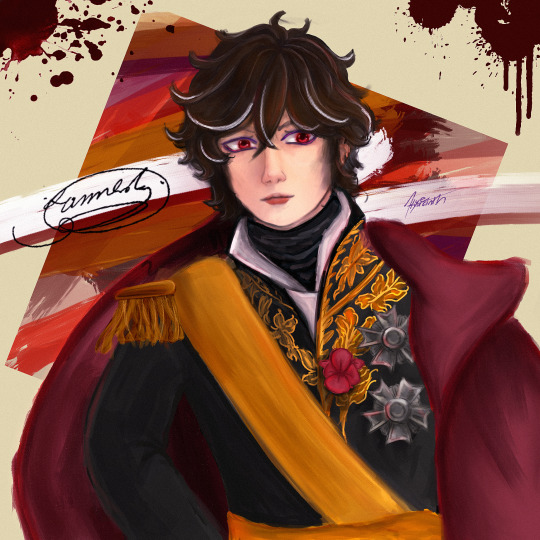
Lannes :D
#reblogs help#jean lannes#hyacinthart#my art#digital art#artists of tumblr#napoleonic era#napoleon’s marshals#napoleonic#marshal lannes#lannes#napoleonic wars#historical figure#illustration
53 notes
·
View notes
Text
Happy birthday Marshal Lannes! April 10, 1769
I got a few selections about Jean Lannes from "Napoleon's Military Career" by Montgomery B. Gibbs
The first three, from the Italian campaign 1796/1797
At Dego:
Here also, Lannes, who lives to be a marshal of the empire, first attracted the notice if Napoleon, and was promoted from lieutenant-colonel to colonel.
At Lodi:
Lannes, Napoleon, Berthier, and L'Allemand now hurried to the front, rallied and cheered the men, and as the column dashed across and over the dead bodies of the slain which covered the passageway, and in the face of a tempest of fire that thinned their ranks at every step, the leaders shouted: "Follow your generals, my brave fellows!"
At Bassano:
Lannes seized one of the standards with his own hands, and, in consequence, Bonaparte demanded for him the rank of general of brigade. "He was," he said, "the first who put the enemy to route at Dego, who the Po at Plaisance, the Adda at Lodi, and the first to enter Bassano."
At Marengo:
"The shower of balls from the Austrian musketry was at one time so intense that Lannes, speaking of it afterwards, described it's effect with a horrible, graphic homeliness. "Bones were cracking in my division," he said, "like a shower of hail upon a skylight." Lannes was subsequently created Duke of Montebello.
At Ratisbon:
Napoleon now sent an aid-de-camp to Lannes urging him to expedite the taking of Ratisbon. This intrepid marshal has directed all his artillery against a projecting house, which rose above the wall surrounding the town. The house was knocked down and the ruins fell into the ditch. Still there were two fortified positions to take. Ladders were procured and placed at the critical points by the grenadiers, but every time one of them appeared he was instantly brought down by the well-aimed balls of Austrian sharpshooters. After some men had been thus struck, the rest appeared to hang back. Thereupon Lannes advanced, covered with decorations, seized one of the ladders and cried out: "You shall see that your marshal, for all he is a marshal, has not ceased to be a grenadier!"
At Aspern-Essling:
Just as Napoleon was about to retire for a few hours' rest he was interrupted by a violent altercation between two of the chief lieutenants, Bessieres and Lannes, the former of whom complained of the language used by the latter, his inferior in rank, in giving a necessary order for a charge of cuirassiers and Chasseurs, then under the orders of Marshal Bessieres himself. Massena, who was on the spot, was obligated to interfere between these gallant men, who, after having braces for a whole day the crossfire of three hundred pieces of cannon, were ready to draw their swords for the sake of their offended pride. Napoleon allayed their quarrel, which was to be terminated the best day by the enemy in the saddest way for themselves and for the army.
#napoleon#napoleon bonaparte#lannes#marshal lannes#jean lannes#napoleonic marshals#birthday#dego#lodi#bassano#marengo#ratisbon#Aspern-Essling#Napoleon's Military Career#Montgomery B. Gibbs
31 notes
·
View notes
Text
Napoleon wants Lannes to apologize to Murat, it does not go as intended
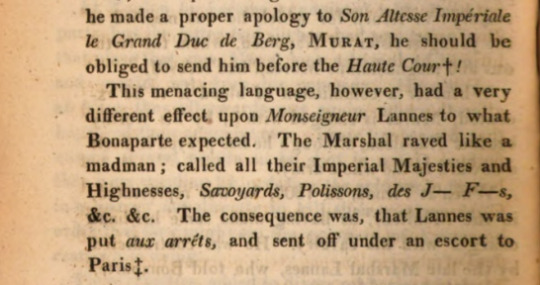
— The secret history of the Cabinet of Bonaparte by Lewis Goldsmith, 1810.
44 notes
·
View notes
Text
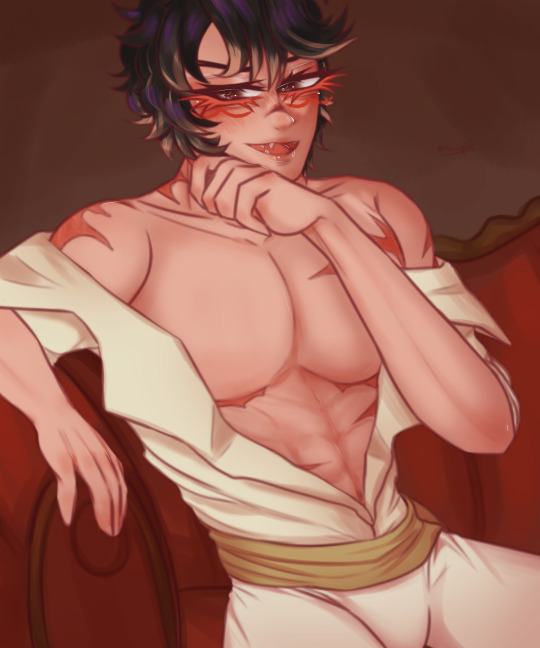
i hav a horrible terrible headache, im just posting this everywhere before i go to bed otherwise i would forget :(( goodnight!! ^-^
11 notes
·
View notes
Photo
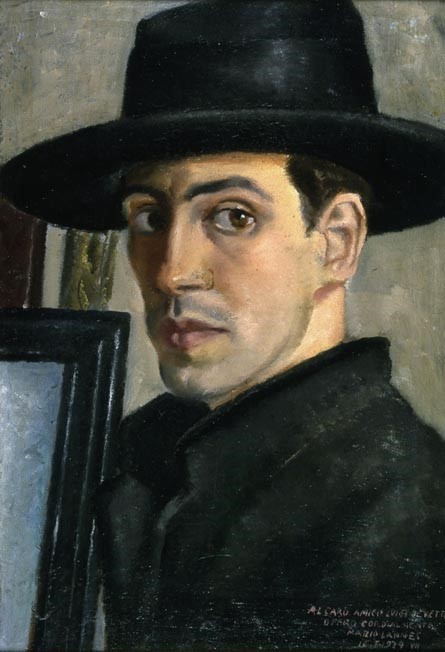
Mano Lannes - Self Portrait
13 notes
·
View notes
Text

Inked and coloured Version of the Lannes sketch
48 notes
·
View notes
Text

#napoleonic era#napoleonic wars#napoleon#napoleon bonaparte#michel ney#ney#eugene de beauharnais#jean de dieu soult#soult#joachim murat#murat#jean lannes#lannes#louis alexandre berthier#berthier#napoleon's marshals#fanart#19th century#history#i have broken my resolution and drew lips again#it didnt end well#i hereby solemnly swear to never try again#my art
77 notes
·
View notes
Text
So I found this in The Beast in the Boudoir: Petkeeping in Nineteenth Century Paris by Kathleen Kete….

So I looked him up and found his Wikipedia page and…. Moustache the dog had a very eventful life. He was even awarded a medal from Lannes for his service :D


#heheheh so cuteee#seems fictional af and no I do not care#Moustache is REAL in my heart and he is a brave and decorated military dog#Moustache#dog#Napoleon’s dog#napoleon#Lannes#Jean Lannes#marshal Lannes#napoleonic#napoleonic era#napoleon bonaparte#first french empire#dogs#history#The Beast in the Boudoir: Petkeeping in Nineteenth Century Paris#The Beast in the Boudoir#Kathleen Kete#Kete
25 notes
·
View notes